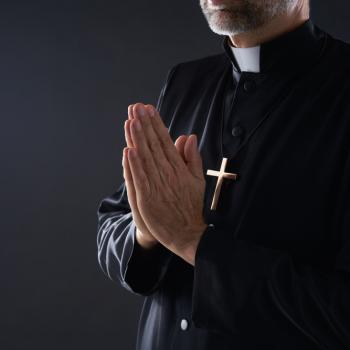The late astronomer Carl Sagan once wrote in his book Contact, “For small creatures such as we, the vastness is bearable only through love.” It’s only fitting, then, that his daughter Sasha Sagan has carried on his legacy with her own book focusing on secular rituals that provide meaning in our lives.
In this exclusive interview, coinciding with the paperback release of For Small Creatures Such as We, Sasha and I spoke about what she’s learned since writing the book, what religious readers can take away from it, and her own feelings about the word “spiritual.”

The Book Itself
REBEKAH: I think For Small Creatures Such as We is an amazing book, and with that comes the difficulty of being able to succinctly describe just what it is about. It’s often described as “part memoir, part guidebook, part social history.” In your own words, how would you describe the book to someone who is unfamiliar, and how do its three elements flow together?
SASHA: Well, firstly, thank you. In a way, it’s really just the story of how I’ve managed to marry the awe for nature as revealed by science that my parents instilled in me with my love of rituals and holidays. I am secular and do not subscribe to the supernatural but I love to celebrate. As I researched traditions from around the world and throughout history I found that just beneath the surface there is so often a scientific phenomenon being honored, whether it’s the solstices and equinoxes, the phases of the moon, birth, coming-of-age, or death. It’s so often really about astronomy or biology. I don’t believe we need any additional mythology. I think just being alive on this particular planet is, by itself, cause for celebration.
REBEKAH: Is there anything new and special in the paperback edition?
SASHA: Yes! Beyond the beautiful new cover, there is an interview with me and a discussion guide for book clubs in the back. I love the idea of people talking about their own rituals and traditions and reflecting on how and why we do the things we do.
REBEKAH: If you could go back and write your book again, what would you do differently?
SASHA: I always wish I could speak to more people and read more books. I’ve learned of so many rituals and holidays since writing the book that I wish I could have included. There are just seemingly endless permutations of how we celebrate and reckon with being alive. So many are profoundly beautiful and stirring.
REBEKAH: Do you think you will write another book?
SASHA: I hope to. Maybe another book for grown-ups, but my real dream is to write a children’s book someday.
REBEKAH: One of my favorite parts of the book was how your descriptions of the rituals of various cultures seemed so effortless, as if you knew it all personally. But obviously, there must have been a lot of research that went into that. What did your research process look like?
SASHA: I wish I could experience every one of the rituals I wrote about in person, but alas. I read a lot. Often a passing mention in an article or a conversation would lead me to a book on the topic, which would, in turn, lead to some other astonishing topic. I tried to just follow these threads and then worry about braiding them into something linear and readable later.
REBEKAH: For Small Creatures Such as We is usually perceived as a book for secular humanists to enjoy and explore secular rituals. What in the book do you think makes it valuable for religious readers?
SASHA: One of my very favorite things has been connecting with religious readers. The feedback I’ve received from devout friends and strangers has been so interesting. More than a few were surprised that religion was not censored in my home growing up, but rather that my parents encouraged me to learn and experience as much as I could about the variety of beliefs people have on Earth. I hope that religious readers get a sense that many of the specifics of their sacred rituals overlap with the rituals of other philosophies and that many elements long predate the monotheism of the last few millennia. I also hope that religious readers might appreciate that those of us who do not believe in a god or gods still have guiding principles, beloved traditions, and awe for the majesty of life.
Respecting Differences
REBEKAH: How do you balance criticizing the way that religion operates with being respectful and acknowledging the way it recognizes beauty?
SASHA: Well, I love and have loved many devout people in my life. I respect them and I don’t think my role is to dissuade anyone from their belief. I love the grandeur and gravitas religion can evoke. I think because religion was never forced on me it’s easier for me to appreciate certain elements without accepting the whole.
REBEKAH: In the book you discuss having a hard time being respectful and patient towards people with supernatural New Age beliefs that you disagree with. However, it sounds like you’ve had some growth in this area after contemplating how it actually made people feel. How can other skeptics work through this?
SASHA: I hope I have had some growth! I don’t want to be impatient and dismissive, I really don’t. Perhaps because New Age beliefs rarely have the weight of generations behind them the way organized religion does, I have struggled to tiptoe around my criticism in the same way. What I have realized though is that people often gravitate toward astrology and crystals and the like because they crave a sense of connection with the universe and the Earth. But they are led astray by unsubstantiated claims and promises. My hope is to help provide another, more evidence based but still wondrous, sense of connection to the universe and the Earth.
REBEKAH: From both theists and atheists alike in our world, it’s a common outlook to see religion (or spirituality) and science as being fundamentally opposed. From your book it seems that you’re holding space to respect them both and see them as interconnected and sacred. How do you do that?
SASHA: I think for much of human history the more we understood nature the more we understood our deities. It’s only relatively recently that those roads diverged. For those of us without deities understanding nature can still provide that tingling thrill of connection and wonder. For me, the real, provable, evidence-based things are sacred. The little, everyday things — how a plant grows or watching the sunset — are miraculous.
Secular Rituals
REBEKAH: For a lot of us who have left religion or just aren’t religious, it is difficult to find something to celebrate on traditionally religious holidays. This was especially challenging during COVID when many of us had to stay home and could not see our families. How can we apply the philosophy from For Small Creatures Such as We to celebrations like this, when it is hard to stay happy?
SASHA: The isolation of the past year and a half has been so hard. Whether we are believers or not, I think craving community and togetherness, special occasions and breaks from the everyday are very human desires. I tried to think about this time in the scope of history. So many of our holidays originated in times of crisis. In this crisis we have adapted, changed, and invented new rituals to cope. I am really curious to see what we will carry forward from this period and what old traditions we might let fall away. I tried finding new appreciation for small joys, like family walks in the woods and favorite meals. When things first opened back up and my husband and I went on our first real date in more than a year it felt like a second honeymoon. We were euphoric. I hope I can keep from losing that sense of newfound appreciation going forward.
REBEKAH: I’m an atheist and I’ve always had a complicated relationship with the word “spiritual,” and your book has really forced me to reckon with that. Do you identify as “spiritual” and what does that word mean to you? If you don’t, how do you describe your feelings of awe towards the Cosmos?
SASHA: Oh this word! It comes up so frequently. I wouldn’t call myself “spiritual” per se, because the word does connote something a little woo-woo. But I do use it generally. I also use words like sacred, holy, and miraculous because they capture a specific feeling, I think, even when elicited by a scientific understanding of the universe. English is a language that evolved in a monotheistic culture. Because of that, the connotations around these words are monotheistic. But languages evolve. And I think it’s ok to use those words to express our secular awe.
REBEKAH: Many of us loved getting to see how your household growing up influenced your current life raising your daughter with your husband. How has it been, since the writing of the book, to introduce your daughter to different rituals, beliefs, and ideas? Most importantly, has she become any more fond of Halloween costumes?
SASHA: Ha! Yes! She is much more enthusiastic about Halloween costumes, I am delighted to report. Last year she was an octopus. We are still brainstorming for this year. Last week she said she might want a grape costume, still figuring out how we’d make that happen. My husband and I have managed to find new and special ways to celebrate even in the depths of lockdown. And we’ve found new ways to celebrate the simple things. I watch our daughter when we light candles or share a special meal, and I feel like I am seeing everything through fresh eyes. I think that’s often the key to finding wonder and joy.
The paperback edition of For Small Creatures Such as We is out today, online and in your local bookstores. It’s one of my favorites, so I’m sure you will love it as well.
(Featured screenshot via YouTube)




It’s Moving Day for the Friendly ..."
It’s Moving Day for the Friendly ..."
It’s Moving Day for the Friendly ..."
It’s Moving Day for the Friendly ..."